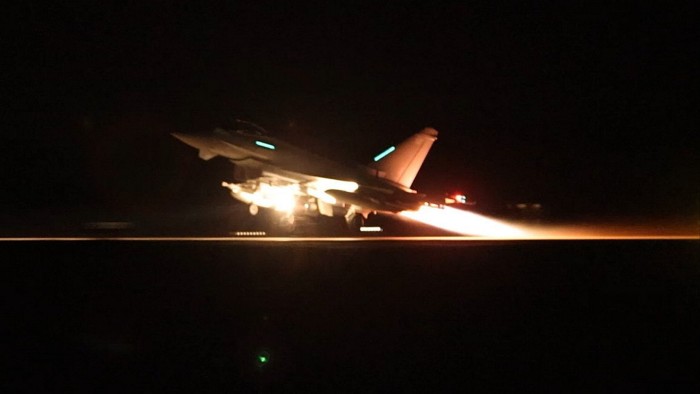Just a day after the Israel-Hamas conflict began, the US sent its newest, most advanced aircraft carrier to the eastern Mediterranean.
Washington hoped the USS Gerald R Ford strike carrier group, plus further US forces, would deter Iran and its myriad proxies in the region and contain the crisis. But three months later, the US has been dragged into combat.
On Thursday night, the US, along with the UK, launched its biggest military operation of the conflict: a barrage of strikes against Houthi rebels in Yemen who have been attacking merchant shipping in the Red Sea. The Houthis are part of the so-called Axis of Resistance of Iran-backed groups that also includes Hamas.
The operation against the Houthis underscored the risks of American forces being sucked deeper into the crisis and the threat of conflict spreading in the region, the very thing the Biden administration has been seeking to avoid since Hamas’s October 7 attack on Israel.
“The US is the only player on the block that . . . has the capacity and potency to deter and counter attacks simultaneously,” said Sanam Vakil, head of the Middle East programme at Chatham House. “The Biden administration is trying to balance deterrence and diplomacy against the Axis of Resistance.”
The problem, she added, was that “this balance was needed before October 7, not in response, and so there is no clear sense of shifting US red lines”.
Biden’s dilemma is how to balance responding to hostile action with trying to contain the Israel-Hamas conflict as Israeli officials warn the offensive in Gaza will continue for months.
“Every day that Gaza continues, the risk of a wider war is certainly mounting,” Vakil said. “But we are not at the point where a wider war is imminent.”
Before attacking the Houthis, American forces had already launched several strikes against Iranian-backed Iraqi militants in response to rocket and drone assaults on US troops in Syria and Iraq. This month, a US air strike killed a senior Iraqi military commander in Baghdad.
There are also rising concerns that border clashes between Lebanese militant group Hizbollah and Israel could spiral into full-blown conflict. If that happened, the US, Israel’s staunchest backer, could feel compelled to intervene — Hizbollah is Iran’s main proxy and the Middle East’s most powerful militant group.
Rising tensions with the Lebanese group have come as the Houthis also intensified their assaults. They have launched nearly 30 attacks against commercial vessels, seized at least one ship and fired on American forces.

The attacks have caused companies like Maersk, the Danish shipping giant, and BP to suspend transits through the Red Sea; more oil tankers began diverting on Friday.
Ships avoiding the Red Sea must take a 5,000-mile diversion around Africa to reach Europe, disrupting global trade and increasing costs. Oil prices rose more than 4 per cent on Friday to above $80 a barrel, the highest price this month.
The Houthis have connected their attacks with the war between Israel and Hamas but US officials sought to separate the two. “This is an issue about global commerce, the freedom of navigation and threats to commercial vessels and international waterways,” said a senior US official.
The US’s retaliation followed other attempts to deter the rebels. Last month, Washington announced a stepped-up international maritime task force for the Red Sea, but just five warships from the US, France and UK are patrolling the southern Red Sea and western Gulf of Aden. The US hopes that other countries will deploy vessels.
US President Joe Biden had instructed his team to exhaust its diplomatic options; after meeting his national security team on January 1, he directed them to work on a joint statement condemning the Houthis and to accelerate work at the UN, but also to refine potential military targets, officials said.
Biden met again with his team on Tuesday after US and UK forces shot down Houthi missiles and drones that officials said were aimed at US ships.
His team presented several options for attacks with partners and directed secretary of defence Lloyd Austin to launch Thursday’s strikes, which the US said targeted the Houthis’ drone, missile, radar and air surveillance capabilities.
The Houthis, who have maintained their grip on Yemen’s populous north through a nearly nine-year war with a Saudi-led Arab coalition, said they would continue their attacks, which they say are in support of Palestinians in Gaza.
Iran, which the US accuses of supplying the Houthis with missile and drone technology as well as intelligence, condemned the attacks as “a blatant violation of Yemen’s sovereignty”.
Tehran has said it has no desire to see the Israel-Hamas conflict escalate into a broader war, while analysts say it does not want a direct conflict with Israel or the US.
This week, however, it seized a tanker off Oman. Iran’s navy said it acted on court orders in retaliation for “oil theft by the US regime”. Iranian forces have previously attacked shipping in key waterways during periods of heightened tension with the US and its allies.
Jonathan Panikoff, director of the Scowcroft Middle East Security Initiative at the Atlantic Council, said the “Axis of Resistance” groups did act independently despite their shared Iranian backing, while a key question was whether the US might target Iranian assets.
“A lot of these groups all have their own independent decision making. That shouldn’t be underestimated. But the question, I think, is going to ultimately be: does the US push back on Iran?” he said.

Arab states are also concerned about the conflict spilling across their borders. US ally Saudi Arabia has been seeking to secure a peace deal with the Houthis and extract itself from Yemen’s civil war; on Friday it urged “restraint”.
Since Saudi Arabia intervened in Yemen in 2015, the Houthis have fired hundreds of rockets and drones at the kingdom. The group also launched a drone and missile attack on the United Arab Emirates in 2022.
In the UK, some in the ruling Conservative party are uneasy about the country’s involvement. A party lawmaker and former minister, Neil O’Brien, questioned how the UK will “avoid being dragged into something we don’t want”, citing on the social media platform X the “failures” of British interventions overseas in the past 25 years.
Few think the initial US and UK attacks on the Houthis will deter the group. The US is prepared for the Houthis to respond and expects to launch more strikes, while US officials concede that the rebels are a challenge for the west to understand and that the risks of miscalculation for both sides are high.
The group’s leader, Abdel-Malek al-Houthi, on Thursday cautioned Arab states not to join the fray and added: “Any American attack will not remain without a response.”
Jon Alterman, director of the Middle East programme at the Center for Strategic and International Studies, said: “The hard thing about deterring the Houthis is traditionally it’s been hard to find things of value [that] you can hold at risk. It’s not that they have big infrastructure they’re trying to protect.”
Abdulghani al-Iryani, a Yemeni analyst at the Sana’a Centre for Strategic Studies, said the Houthis had an “ideological commitment” to opposing the US and Israel. “Now they see they can make an impact, so they’ve taken a chance.”
Additional reporting by Lucy Fisher and David Sheppard in London
Credit: Source link











